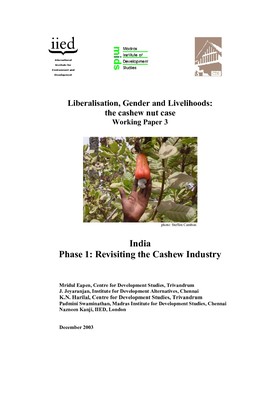Liberalisation, Gender, and Livelihoods: the cashew nut case, Working Paper 3: India Phase 1 - Revisiting the Cashew Industry

Globalisation processes and economic liberalisation are leading to fundamental changes in the livelihood sources of different groups all over the world. This report forms part of a research project on the cashew sector in India and Mozambique. The project is responding to a policy concern that more empirical work is needed to understand the effects of trade liberalisation on poverty and gender equality and to identify approaches which enhance the livelihoods of disadvantaged groups.
India is one of the world’s largest producers of raw cashew nuts, the largest importer of raw nuts (it imports most of Mozambique’s marketed production) and the largest exporter of processed cashew nuts. Cashew provides an important source of income for smallholder farmers and for low-income groups, particularly women, who are the overwhelming majority of workers in the processing sector. This report presents the findings from the mapping phase of the project in India (Sept 2002–Dec 2003). The objective of this phase was to map the export supply chain(s) and to identify changes which are linked to greater liberalisation through the 1990s.
Cite this publication
Available at https://www.iied.org/14510iied